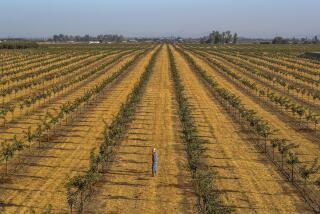A War That’s Really Bananas
- Share via
The “banana wars” are an irresistible temptation to jokesters, but the principle at stake is not so risible. Washington has threatened to impose a 100% import duty on certain Italian cheeses, cashmere sweaters and 14 other products from 13 European Union countries unless they open their markets to Dole and Chiquita bananas, grown in Central America for U.S.-owned companies.
One retaliation could lead to another, igniting a real trade war between the U.S. and the EU that could jeopardize two-way trade exceeding $400 billion a year.
The battle over bananas, now six years old, results from EU trade policies that favor imports from former European colonies in the Caribbean and Africa, precisely the kind of protectionism that Carl H. Lindner, a controlling shareholder in Chiquita Brands International and a political heavyweight in Washington, cannot stand. He filed a complaint with the World Trade Organization, arguing that the policy discriminates against American companies; last year the WTO agreed.
The issue springs from the EU’s complex system of quotas, a slightly disguised form of protectionism that offends the principles of free trade. Faced with the WTO ruling, the Europeans played for time, announcing new rules governing its banana policies. That did not wash in Washington, and the two sides have now reached the mutual retaliation phase.
The WTO was founded precisely to solve these types of conflicts and has a mechanism for doing so. But it takes good sense, good will and compromise. Both sides should dampen their pride and return to the WTO forum.
More to Read
Inside the business of entertainment
The Wide Shot brings you news, analysis and insights on everything from streaming wars to production — and what it all means for the future.
You may occasionally receive promotional content from the Los Angeles Times.










